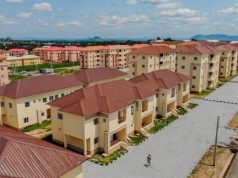For decades, Nigerian governments have announced “affordable housing schemes,” launched “mass housing projects,” and promised millions of homes for citizens. Yet the Nigerian family continues to struggle under the weight of rising rents, substandard shelters, overcrowded rooms, and unaffordable property prices. Housing policy has become a cycle of speeches, groundbreakings, and ribbon cuttings — without real results.
Nigeria’s housing crisis is not mysterious. It is the predictable outcome of failed policies, weak institutions, inconsistent leadership, and misplaced priorities. When citizens cannot afford a decent place to live, it is not simply an economic problem, but a failure of governance.
This editorial calls out the truth many refuse to confront: Nigeria’s housing policies have failed, and the consequences are severe.
- Housing Policy Has Become More Ceremony Than Substance
Almost every administration presents a new “vision” for housing. Estates are launched with media fanfare, politicians pose for photographs, and press statements promise thousands of units. But after the cameras leave, the story changes.
Many government estates are:
overpriced,
poorly situated,
abandoned before completion,
or allocated to political associates instead of low-income families.
The culture of ceremony overshadows the purpose of policy. Housing is treated as a publicity stunt, not a national priority.
- Government “Affordable Housing” Is Not Affordable
The harsh truth is that homes built with public funds rarely match the financial reality of ordinary Nigerians. Units priced at ₦8 million to ₦20 million cannot be described as “affordable” in a country where many earn less than ₦80,000 a month.
Who, exactly, is government building for?
Teachers, nurses, civil servants, artisans, market women — the very people the policy claims to support — are completely priced out. Housing schemes meant for the poor end up in the hands of the wealthy.
Affordability has become a political slogan, not a policy goal.
- The Mortgage System Is Built to Exclude the Average Nigerian
Nigeria’s mortgage framework is notorious for being slow, complicated, and inaccessible. High interest rates, endless paperwork, rigid eligibility requirements, and lack of transparency make it impossible for most people to use.
The Federal Mortgage Bank promises low-interest loans and accessible financing, but everyday Nigerians face:
unexplained delays,
stalled applications,
unclear processes,
and outright rejection.
A mortgage system that cannot serve teachers, civil servants, and low-income earners is failing at its primary purpose. Without accessible financing, home ownership remains a dream reserved for the privileged.
- Abandoned Projects Are Wasting Public Funds Nationwide
From Abuja to Enugu, Lagos to Kano, the landscape is littered with the skeletons of abandoned housing projects. These unfinished estates — overgrown with weeds and stripped by vandals — represent the worst form of policy failure.
Projects are abandoned due to:
corruption,
inflated contracts,
political rivalry between administrations,
poor planning,
and lack of continuity.
Billions of naira vanish into concrete shells that never become homes. Government builds halfway, then moves on to the next photo opportunity.
- Land Policy Is a Barrier, Not a Gateway
The Land Use Act, which centralizes land ownership under governors, remains one of the most restrictive land laws in the world. Obtaining land or a certificate of occupancy is a frustrating journey through bureaucracy and corruption.
High costs, opaque approval processes, and political interference suffocate genuine housing development. Until land access is reformed, housing expansion will continue to crawl.
- Poor Regulation Enables Building Collapse and Unsafe Homes
Nigeria suffers regular building collapses because regulatory agencies are weak, compromised, or simply uninterested. Developers cut corners, use substandard materials, and flout safety standards — often with official approval from corrupt inspectors.
When government agencies fail to enforce building codes, the result is predictable:
unsafe houses, collapsing buildings, and preventable deaths.
Housing policy must guarantee safety, not leave citizens at the mercy of unregulated construction.
- Renters Are Left Without Protection
While policymakers focus on home ownership, over 70 percent of Nigerians are renters. Yet renters have almost no protection under existing housing policies. Rent increases are arbitrary, and many landlords still demand one or two years’ rent upfront — a practice that is technically illegal but rarely punished.
Without tenant protections, families are pushed into poverty, forced to relocate annually, or trapped in overcrowded, unsafe accommodations.
A national housing policy that ignores renters is incomplete.




